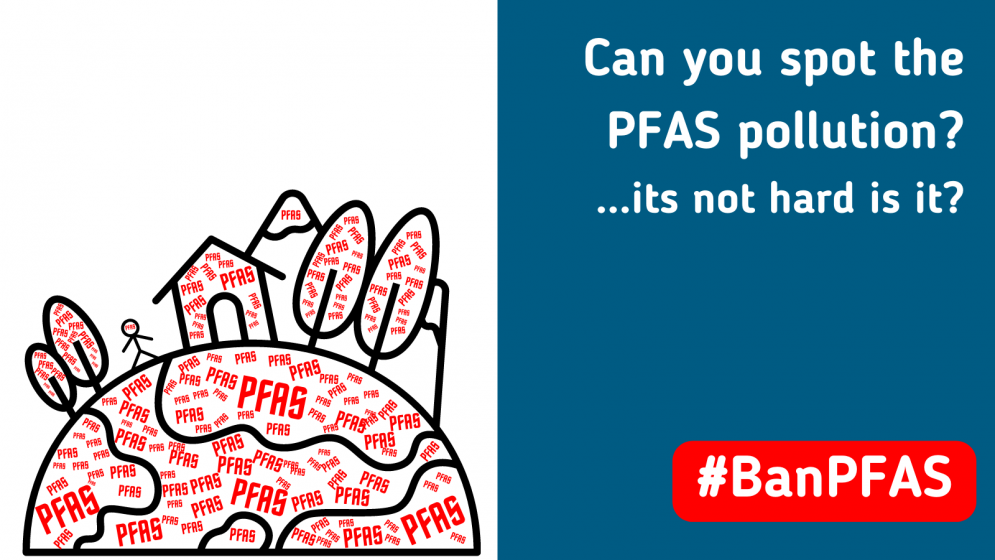With the news that representatives from Germany, the Netherlands, Sweden, Denmark and Norway have submitted their collaborative PFAS restriction proposal to ECHA, the European Chemical Agency, we take a brief look at steps taken by other countries to address the global PFAS problem whilst we wait for the UK Government to take action themselves.
Although we recognise that there has been significant political delay over the past few months, the unequivocal evidence demonstrating global contamination of the environment by PFAS has not changed; we must take urgent action. Unfortunately, in these months that have passed, the UK has taken no direct action to reduce any aspect of the PFAS pollution burden. So, let’s look to other countries whose governments are taking positive steps to address this major environmental and human health issue.
Recent Global Action
The following is a summary of some of the main advances in addressing PFAS pollution that have occurred recently. Pollution from PFAS is a global issue, and it is helpful to use a global lens when looking at political and regulatory change.
- Top of the news is that five countries – Germany, the Netherlands, Denmark, Sweden and non-EU state Norway have submitted their joint PFAS restriction proposal for consideration by the EU. They are considering PFAS as a group, with the dangers of PFAS persistence being considered throughout the dossier.
- New York becomes second state to ban PFAS-containing clothes
- New Zealand prohibits ‘legacy’ PFAS firefighting foams in uncontained systems whilst working towards a complete ban on PFAS-containing firefighting foams in Dec 2025.
- US Congress has approved $250 million to the Department of Defence to address PFAS contamination in and around military bases.
- Chemical giant 3M says it will stop PFAS production by 2025
- California and New York have banned PFAS in food packaging.
- More than 50,000 Danish citizens have called for a national ban on PFAS in consumer products as they believe that EU-wide action is taking too long.
Increasing evidence of PFAS exposure and accumulation
Whilst we wait for visible action in the UK, the evidence of the harmful effects of PFAS and their accumulation in the environment and human and wildlife populations continues to build.
PFAS continue to be a serious chemical global threat through their negative health effects in humans and wildlife. The actual risk of PFAS is high, but many people remain unaware of them. Recently published research shows that in 2019, at least one PFAS was detected in 60% of the public groundwater wells and 20% of the private groundwater wells used as drinking water sources in the eastern USA. In England, the Environment Agency found PFAS contamination in 97% of 470 freshwater sites analysed between 2014 and 2019.
Researchers have also found freshwater contaminants accumulate in plants and animals, where they can be transferred to humans via ingestion. A US study published in January 2023 found freshwater fish with widespread high levels of PFAS, which if eaten would be equivalent to drinking contaminated drinking water. Distributed by the water cycle, PFAS have been allowed to contaminate remote corners of the planet and negatively impact its wildlife. In Antarctica, accumulations of one type of PFAS – perfluorobutanoic acid – in snow increased more than 200-fold between 1957 and 2015.
Researchers have also found high concentrations of PFAS in Arctic algae. Algae are an important food source for zooplankton, with their contamination feeding upwards through the food chain to fish and shrimp, then seals, and finally to apex predators such as polar bears. For many people, current PFAS exposure levels are unlikely to be high enough to warrant serious concern. However there is increasing evidence that they affect early brain development. For adults, exposure in some occupations, including firefighting and chemical manufacturing and processing, are likely to be much higher than others.
What we are still hopeful for
Our joint NGO recommendations are pragmatic (please read our statement here). As NGOs, we understand that transitional times to phasing out a product are required, and we are not asking for an immediate ban. However, some actions can be taken right now to reduce the PFAS pollution burden, like phasing out the frivolous use of PFAS where it is non-essential and where alternatives to PFAS have already been identified (i.e. food packaging).
We urge the UK Government to take urgent action to establish a group restriction on all non-essential uses of PFAS, to reduce the PFAS burden we are creating now and for many generations to come.
If you are concerned about your exposure to PFAS chemicals in any way, please write to your parliamentary representative to express your concern over the ubiquity of these persistent pollutants in our bodies and the environment.
Tags: #Pollution, Chemical Pollution, Environment, PFAS, Restrictions

